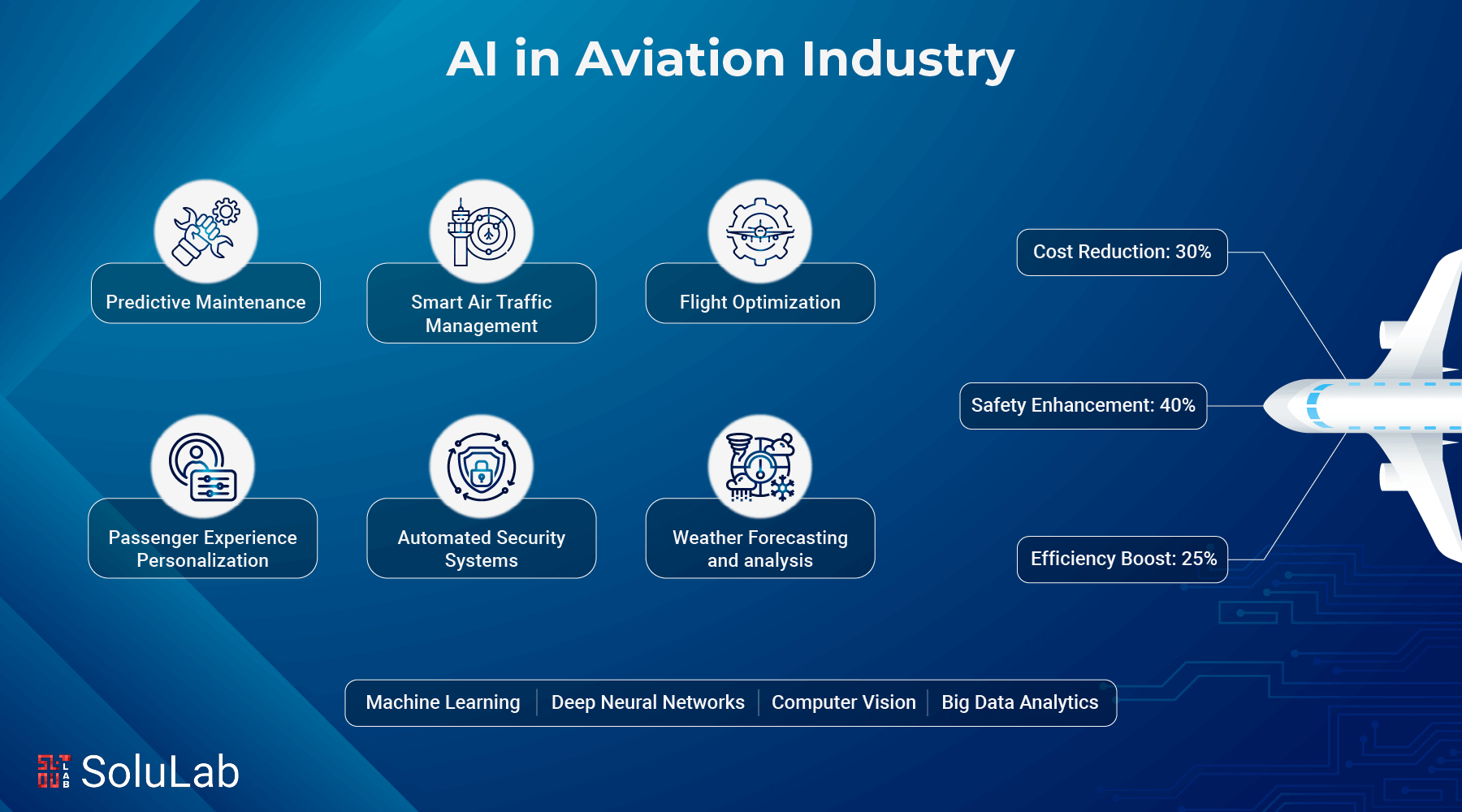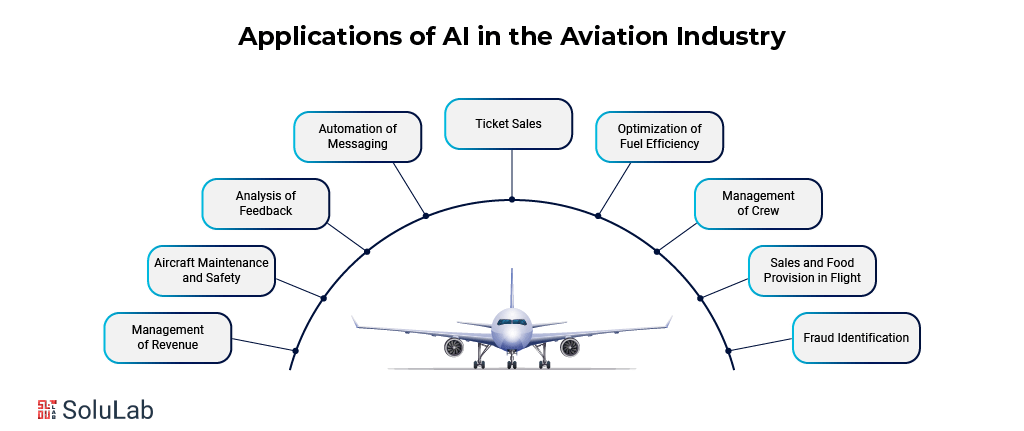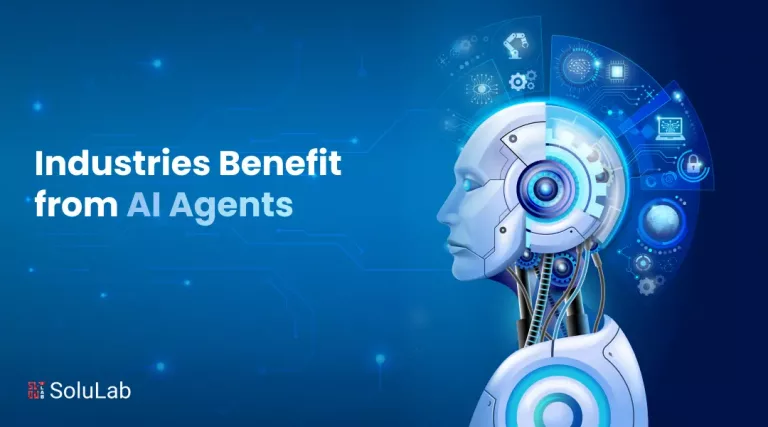
The aviation industry has always faced complex challenges– flight delays, safety concerns, high operational costs, and fluctuating customer expectations. These issues not only impact profitability but also disrupt the passenger experience.
But, AI is currently included in many airline sector solutions, ranging from customer service to crew management, maintenance, and flight planning. From predictive maintenance that prevents mid-air faults to AI-powered chatbots that assist travelers 24/7, artificial intelligence is making aviation faster, safer, and more customer-centric.
The aviation industry is quickly adopting digital technologies to boost efficiency and safety, with global tech investment expected to reach $3.9 trillion by 2027.
In this blog, we’ll explore the key ways artificial intelligence is reshaping the aviation industry, making it smarter, safer, and more responsive.
What Are Different Ways That AI Can Be Used in Aviation?
AI has several applications in aviation, such as in aviation education programs for air traffic control, flight optimization, predictive maintenance, Generative AI for customer service, and more such as:
1. Predictive Upkeep
AI systems examine sensor data from airplanes to anticipate any malfunctions before they happen. By making sure that every element works properly, this proactive approach lowers downtime, prolongs the life of aircraft components, and increases overall safety.
2. Optimization of Flight
AI flight routes for shorter trip times and more fuel economy. AI can recommend the most cost-effective routes by considering weather, air traffic, and other factors, saving airlines money and reducing their carbon footprint.
3. Management of Air Traffic
AI improves air traffic control by supporting decision-making and real-time data processing. AI systems can anticipate possible airspace conflicts, recommend alternate routes, and enhance aircraft coordination, all of which contribute to safer and more effective air travel.
4. Client Support
AI-powered chatbots and virtual assistants enable airlines to offer prompt and effective customer support. By answering questions about flight status, luggage monitoring, and ticket reservations, these AI solutions free up human employees to work on more difficult problems.
Applications of AI in the Aviation Industry

Let’s examine the various uses of AI in aviation in Customer Service Automation, illustrating its effects using actual cases.
1. Management of Revenue
AI algorithms analyze data, estimate demand, and adjust ticket pricing to boost income. This system uses prior data, booking trends, and consumer preferences to calculate the optimum seat cost by weather, season, and day. Delta Airlines employs AI-driven revenue management to set rates.
Delta president Glen Hauenstein describes how AI affects consumers’ willingness to pay for high-end goods through a cooperative process in which analysts optimise and robots act.
2. Aircraft Maintenance and Safety
In 2023, unplanned maintenance caused over 7% of flight delays. AI is addressing this. AI can improve air safety by analyzing data from weather inputs, flight data recorders, and aircraft sensors. This improves safety by identifying potential issues.
AI-powered predictive maintenance technologies help airlines find faults, schedule repairs, and track airplane components in real time. Proactive maintenance reduces downtime, costs, and optimizes operations.
3. Analysis of Feedback
Airlines rely on customer feedback, and AI can help them comprehend it. AI-driven sentiment analysis tools like PureStrategy, leveraging Automated Neural Intelligence Engine (ANIE), can sort through social media, blog posts, comments, customer review websites, and surveys to find patterns, sentiments, and recurring themes.
Through this proactive strategy, airlines can gain valuable customer insights to quickly resolve issues and improve their services.
4. Automation of Messaging
Messaging automation improves aircraft customer service. Airlines utilize it to speed up operations and answer questions. Flight timings, gate modifications, and other important information are now automatically sent to passengers to save time and stay informed.
AI chatbots are a good place to start messaging automation. Chatbots can handle real-time flight updates, baggage concerns, and travel reservations.
5. Management of the Crew
AI in crew scheduling improves airline’s 5 flights. AI helps airlines ensure each plane has the right crew with the right training. This increases safety, reduces delays, and enhances travel.
Malaysia Airlines Berhad (MAB) inked a five-year contract to use IBS Software’s iFlight Crew crew management system. Their website says iFlight Crew is a cloud platform that optimizes airline operations and crew management with AI and machine learning.
6. Optimization of Fuel Efficiency
Given the significant influence that fuel prices have on overall expenditures, artificial intelligence (AI) is essential to increasing fuel economy in the aviation sector. AI algorithms maximize fuel economy by evaluating variables such as weather, flight paths, aircraft performance, and passenger load.
For instance, AirAsia employs OptiClimb, a fuel-efficient method. This program predicts fuel use using sophisticated weather forecasts and machine learning techniques. To save up to 3% of fuel per flight, it recommends the best ascent speeds during takeoff.
7. Ticket Sales
Bookings are more personalized using AI-powered ticket suggestion engines. These technologies recommend flights based on your past travel preferences, budget, and selections, making flight choosing easier. This technology streamlines booking and finds better deals.
For instance, Elemental Cognition and Oneworld Alliance created an AI application for arranging and buying “Round the World” (RTW) tickets.
Read Also: Top 10 AI Development Companies in 2025
8. Sales and Food Provision in Flight
Airlines can use AI to adapt in-flight meals to passengers’ dietary needs and tastes using creative demand-predicting algorithms. AI can reduce catering waste.
Airbus is developing the Food Scanner. This AI-powered device has a downward-facing camera and barcode scanner. It monitors in-flight food, meal trays, and beverages before and after service. Passengers can purchase meals in advance and organize catering using key performance indicators from a cloud-based dashboard, reducing waste.
9. Fraud Identification
AI is essential for detecting airline fraud since it reduces the risks associated with fraudulent activity. AI algorithms quickly identify suspicious trends and draw attention to possible fraud by examining large amounts of transaction data.
An excellent illustration is the Airlines Reporting Corporation’s (ARC) Risk Check, which uses artificial intelligence (AI) algorithms to examine more than 3 billion data points and find cases of fraudulent travel bookings.
Real World Use Cases of AI in the Aviation Industry
Let’s explore how four major airlines are leveraging AI to tackle real challenges, drive innovation, and improve the passenger experience:
1. Delta Air Lines
A global leader in passenger traffic and operational scale, Delta continuously invests in AI to refine its services.
- Challenges: Delta faced significant delays and complex flight disruptions, most notably, the CrowdStrike-related outage in July 2024 that grounded thousands of flights.
- Solution: Delta uses AI-driven predictive analytics for scheduling, dynamic crew assignment, biometric boarding, and AI-powered chatbots during recovery periods.
- Results: Enhanced on-time performance, 35 % increase in customer satisfaction, 40 % faster check‑in, and more resilient operations during crises.
2. Southwest Airlines
The U.S. domestic giant known for no-frills service, Southwest, is deepening its AI investments.
- Challenges: Outdated legacy systems caused massive scheduling meltdowns (like the December 2022 crisis), with crew mismanagement and delays.
- Solution: AI now powers predictive maintenance across its 800-strong Boeing fleet and optimizes flight schedules, crew planning, and customer service via NLP-driven chatbots.
- Results: Faster response to incidents, improved safety alerts (SmartRunway rollout), improved crew processes, and greater operational reliability.
3. United Airlines
A global carrier with strong international reach, United Airlines has expanded AI use across operations and customer interactions.
- Challenges: Managing flight delays, lost luggage, overbooking, and customer transparency posed recurring issues.
- Solution: United adopted generative AI for delay explanations (“Every Flight Has a Story”), integrated AirTags in baggage tracking, automated accessibility requests, and optimized flight schedules and revenue management.
- Results: 5–6 % uplift in satisfaction, 64 % automation of special requests, reduced mishandled baggage, smarter overbooking outcomes, and responsive rebooking support.
4. Singapore Airlines
Asia’s premium flag carrier, consistently ranked among the world’s best, SIA is doubling down on AI-led transformation.
- Challenges: To maintain service excellence and streamline intricate operations like crew scheduling, MRO, and customer support.
- Solution: Partnering with OpenAI in 2025, SIA is deploying generative AI solutions for its virtual assistant, crew planning, multimodal info processing, and predictive maintenance systems.
- Results: Enhanced customer and staff assistance, smarter crew allocation, and improved fleet reliability, establishing a foundation for scalable and efficient operational excellence.
Can Artificial Intelligence Fly a Plane?
Artificial intelligence is being used more and more to help with different parts of flying, even if it hasn’t yet advanced to the point where it can fly an airplane entirely without human assistance. Numerous commonplace tasks, like monitoring systems, modifying aircraft routes, and interacting with air traffic control, can be performed by AI systems. Full AI-operated flights are still at the experimental stage and rare in commercial aviation, however, some autonomous flight technologies have been developed. Human pilots are still necessary for making decisions in difficult or urgent circumstances.
The Future of AI in Aviation

Even while AI won’t be taking the place of pilots anytime soon, it will be crucial to the aviation sector’s future. Important elements consist of:
1. Forecasted Prices
Predictive pricing driven by AI is becoming more and more popular. Airlines can provide each passenger with a customized travel experience and competitive pricing by using AI algorithms to analyze vast amounts of data, including personal preferences and current market trends. This technology is already being used by Atlantic and Fetcherr to optimize operations and revenue by adjusting prices based on anticipated market variables. To optimize their revenue systems, more airlines are likely to adopt this “generative pricing engine.”
2. Eco-Friendly Air Travel
2% of the CO2 emissions linked to energy worldwide come from aviation. However, artificial intelligence will enable the International Air Transport Association to achieve its goal of net-zero emissions by 2050. Airlines can make informed judgments about operations, fuel consumption, and aircraft itineraries by utilizing machine learning and advanced analytics. By reducing carbon emissions, this data-driven strategy supports sustainability objectives and accelerates the sector’s transition to a more environmentally friendly future.
3. Improved Systems for Aircraft Health
AI-powered smart airplane health systems will grow in popularity. By analyzing data from the aircraft’s onboard sensors, these systems can identify possible problems early on and perform preventive maintenance. AI in health care reduced unscheduled maintenance, less aircraft downtime, and more safety are all benefits of this predictive strategy. Deloitte claims that this kind of predictive maintenance might reduce airplane operating expenses by up to 25% and avoid disruptions that could result in fatalities.
4. Better Flight Paths
Fuel makes up 22% of airline operating costs, making it the second-largest expense, according to Investopedia. Route planning that is impacted by air traffic and weather variations is to blame for this enormous expenditure on aviation fuel. Airlines will use AI tools and platforms more and more in the upcoming months and years to alter this perception.
5. Human-AI Collaboration
AI will probably work alongside human pilots in the cockpit rather than take their place. AI assistants are capable of managing repetitive activities and making recommendations in unusual circumstances. However, the pilot will continue to be responsible for critical thinking and complicated problem solving. Future flight operations will rely heavily on this human-AI collaboration.
6. Aviation Job Evolution
Routine duties will be replaced by AI-driven solution, freeing up aviation jobs to concentrate on creativity, detailed problem-solving, and passenger connections. To maintain these systems in line with aviation objectives, new roles such as data scientists and AI trainers will also be created.
These platforms analyze enormous volumes of data, such as weather patterns, air traffic, and previous flight data, and use projections and historical data to deliver fast insights. The outcome? routes that are optimized to save delays and conserve fuel. AI-powered route planning constantly adjusts in real-time to increase efficiency and reduce total flight time.
As is evident, there is a lot of potential for artificial intelligence in the airline sector. AI applications are expected to drive further revolutionary developments in this business as technology develops.
Conclusion
The aviation sector is achieving previously unheard-of levels of intelligence, safety, and efficiency as a result of the incorporation of artificial intelligence (AI). AI is currently having a noticeable impact on airport operations, improving passenger experience, optimizing flight routes, and changing safety procedures. AI’s full potential in aviation has not yet been reached, though.
As AI technology develops further, it will open up previously unimaginable possibilities and breakthroughs. The aviation industry is prepared to receive this AI-driven future with zeal and resolve, despite adoption obstacles.
SoluLab, a top AI development company in the USA, renders AI solutions that boost efficiency and performance. We recently helped AI-Build, a construction tech company, use generative AI and machine learning for advanced product development in the CAD space.
Our team of experts is ready to solve your business challenges. Contact us today to get started!
FAQs
1. Can AI replace pilots in the future?
AI can automate many flight tasks, but human pilots remain essential for critical decision-making, emergencies, and passenger trust. While AI enhances safety and efficiency, full autonomy in commercial flights is unlikely soon due to regulatory, ethical, and technological challenges.
2. How does AI help with aircraft maintenance?
AI-powered predictive maintenance analyzes sensor data to detect potential issues before they cause failures. This proactive approach reduces unplanned downtime, lowers maintenance costs, and enhances aircraft safety by ensuring timely repairs and part replacements, improving overall operational efficiency.
3. What AI technologies are commonly used in aviation?
The aviation industry leverages machine learning for predictive analytics, computer vision for security and inspections, natural language processing (NLP) for customer support, and robotics for baggage handling and maintenance. These technologies optimize operations, enhance safety, and improve passenger experience.
4. Can AI help reduce flight delays?
Yes, AI processes real-time weather, air traffic, and operational data to predict potential delays. It optimizes flight routes, improves scheduling, and enhances decision-making, helping airlines minimize disruptions, reduce wait times, and improve overall efficiency in air travel.
5. How does AI improve aviation safety?
AI enhances safety by identifying mechanical issues before failures, assisting pilots in real-time decision-making, and strengthening security screening. It analyzes flight data to detect anomalies, prevents human errors, and ensures compliance with safety regulations, making air travel safer and more reliable.





